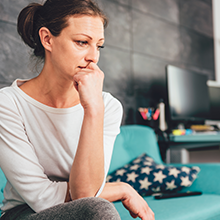Anxiety can be a touchy subject. In fact, in my experience, all mental health issues can be touchy subjects. It’s not the ideal picture, and I can see...
Anxiety can be a touchy subject. In fact, in my experience, all mental health issues can be touchy subjects. It’s not the ideal picture, and I can see that we as a group are starting to become more comfortable and accepting of mental health issues, however we still have a way to come.
Mental health can be quite confronting. It can make you feel all kinds of things ranging from hopeless, to weak, to vulnerable and fragile. Sometimes knowing what is going on, understanding why it is happening, how common it is, and being aware of how you can help yourself, can be a huge relief and just what you need to keep you feeling somewhat in control.
It’s back to the old adage, ‘knowledge is power’.
Before we get into the nitty gritty of the ‘hows’, we can simply liken perimenopause and menopause, to puberty. It’s a crazy time for a lot of reasons, and there are lot of ‘behind the scenes’ things occurring that can cause the fireworks and rollercoasters. This can be the simple and quick explanation for how you feel and how you’ve been acting. The in-depth reason involves the complicated sex hormones.
Perimenopause marks the time leading up to menopause. It often starts in the mid to late forties, and continues until your last period has passed, and the ovaries have finally retired. During this time the ovaries start to become unreliable in their function, unpredictable in their malfunction Sometimes they overcompensate for their performance. Oestrogen and progesterone are the key hormones involved in the ups and downs of perimenopause. Both are quite powerful.
Oestrogen typically fluctuates in a lovely up and down manner throughout the month. In a complex and thoroughly impressive mechanism, your brain keeps tight control over your oestrogen production and controls its fluctuations.
Progesterone is only present in the body once ovulation has occurred. If ovulation doesn’t occur, no progesterone is produced for that menstrual cycle. Once again, it is a complex and impressive mechanism that needs to happen for ovulation to occur. Generally, ovulation occurs every cycle and the lack of pregnancy results in the menstrual bleed.
Unfortunately, perimenopause is the time when ovulation is hit-or-miss, and the communication between the brain and the ovaries starts to break down, interrupting the oestrogen control the brain once had.
This is where it starts to get unpredictable.
When your body produces oestrogen in its lovely fluctuations, but you don’t ovulate and don’t produce any progesterone, you end up in an oestrogen dominant state (your normal oestrogen levels are dominating over your non-existing progesterone levels). This can result in oestrogen, a stimulating hormone, over-stimulating the body, across the board, leaving you in a heightened stimulated state. This may express itself as the overactive anxiety state.
This lack of ovulation also leaves you in a progesterone deficiency state. Progesterone is a calming, soothing, relaxing hormone, and when it fails to show up (due to a lack of ovulation), you lose out on the calming, soothing and relaxing effects that you are used to having. Without this, it is understandably quite easy to become overwhelmed, agitated and anxious. To top this off, this change in mood often occurs ‘out of the nowhere’ (which can make you even more unsure or anxious).
The other common state of hormonal change you often pass through is oestrogen deficiency. This occurs as you get closer to menopause and the ovaries get closer and closer to retiring completely. A lack of those lovely monthly oestrogen fluctuations can significantly impact the protective or balancing effect oestrogen has, particularly on the brain chemical serotonin. Serotonin is often referred to as your happy hormone and it plays a large role in mood balancing. Oestrogen supports or increases your serotonin levels, helping you keep your cool. Without oestrogen, your serotonin levels can drop, and your mood control can struggle. Anxiety can occur.
Serotonin also plays a role in your sleep quality. Unfortunately, but not at all unexpectantly, a lack of sleep can impact your stress, worry and anxiety levels.
Night sweats can interrupt your sleep, impacting your anxiety levels.
Hot flushes, or the embarrassment that can come with hot flushes, can impact your anxiety levels.
Lack of concentration, memory concerns and weight gain can impact your anxiety levels.
Concerns about ageing can impact the picture, and we notice quite a lot of life challenges occurring at this time (kids, elderly parents, sicknesses, marriage, work… life), significantly impacting your stress levels, the feeling of being overwhelmed, and the possibility of anxiety.
On a nerdier note, oestrogen is involved in neuronal synapse activity, is both neuroprotective and neurotrophic on tissues within the brain and calms the fear response. This is the hormone that starts to slow down with menopause, requiring the body to readjust.
Of course there may be other reasons for your anxiety (there are many possibilities), however sex hormones, perimenopause and menopause are key suspects, especially if it has just started or exacerbated in your mid to late forties.
I hope it’s no longer surprising that anxiety may sneak into your life during perimenopause and menopause. It’s quite common and you are not alone. You don’t simply have to ‘put up with it’. Speak with the team at the Australian Menopause Centre if you would like some support.
Thankfully, when the menopausal influence calms down, the anxiety often calms down too. However, this can take some time (years). Let us know if you would like to talk.
About The Author - AMC Team
Our team consists of doctors, nurses, program assistants, naturopaths and nutritionists that join their wealth of knowledge to offer our patients and website visitors interesting and insightful articles to assist you understand the symptoms you are experiencing and how to relieve them.


